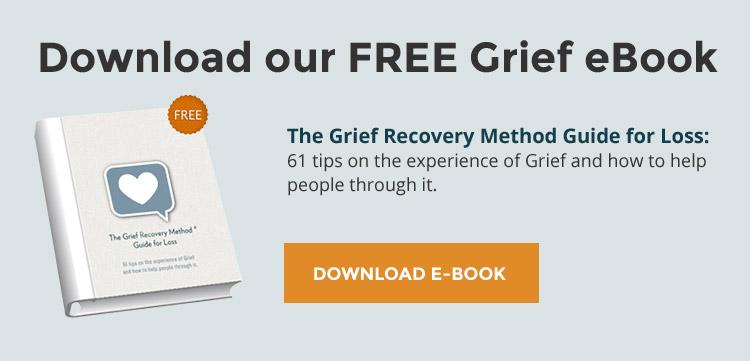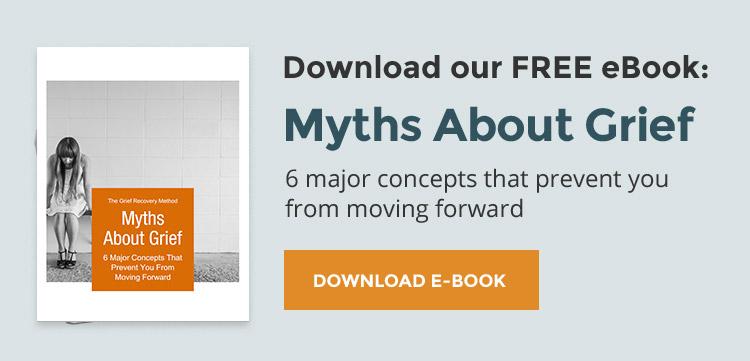
Pain sucks! I didn’t always know this – and to be honest, sometimes I wasn’t very kind to people who were experiencing pain – the physical kind at least. I’ll admit, I thought they should “toughen up and deal with it. I remember thinking, why don’t they just take some over the counter pain medicine and get back to work or life. How bad can it be?” I’ve always been drawn to those in emotional pain; that’s what drew me to the Grief Recovery Method. In my career in Public Health I met and knew people with various serious conditions; kids with Reye’s Syndrome, young people with HIV/AIDS and people of all ages with cancer. And while certainly the medical professionals were dealing with the physical pain involved in each of these conditions, there were very, very few who were addressing their emotional pain. So that’s where I focused my efforts.
But when I began to get pain from arthritis that when things changed for me. I remember getting ready for work one day and the pain in my shoulder was so bad, I thought “this arm is useless to me,” and I began to cry, begging God to just let the pain end, that I’d do anything to make it go away. Some nights I even thought what would it be like to wake up in heaven and not be in pain anymore? Wow, that’s me! I’m the one with pain and it got worse, with both shoulders, both knees and a couple other random joints. And I was the one taking those over the counter meds and thinking about waking up without pain. What must it have been like for those others, for whom I’d had such little compassion? Especially those who had moved from the over the counter meds to prescription pain killers, and then to street drugs or anything else they could beg, borrow, steal or forge prescriptions for? How bad must their pain have been? I can’t even begin to imagine their pain and, in the pursuit of relief, how many drug overdoses have resulted. I had some serious apologies to deliver!

But the story isn’t always just about physical pain. Sometimes it’s physical pain combined with emotional pain, and how bad can that emotional pain be? I’ve heard some pretty devastating stories in my 20+ years providing Grief Recovery programs. In my Public Health arena, we started talking about the Adverse Childhood Experiences Study back in the late 1990s and how those serious things that happen in children’s lives can lead them to addictions to alcohol, drugs and other “health risk behaviors.” In the Grief Recovery Method (GRM), we call them STERB’s, Short Term Energy Relieving Behaviors. Two names for the same things! That’s when my Public Health world and my Grief Recovery world came together, leading me to believe that Grief is the #1 unaddressed Public Health issue of our day and that 100% of us are grievers. The ACE study shows that over 60% of us have at least one ACE in our growing up story. But that doesn’t include things like a pet dying, moving from one house to another, your first love dumping you, or any of the other “minor” losses we all experience as children. 100% of us are grievers, it’s an epidemic, and it’s getting worse. Just watch the news.

This is where the opiate crisis comes into the picture. When the pain gets so bad, we’ve now been conditioned, thanks to advertising, changing healthcare practices and a “quick-fix” mentality, to just want something to make the pain go away. Here, take a pill and fix your life. Opiates, along with other drugs, do just that. They do it well, in fact too well, and we want more and we want them more often. This is the description of “short-term energy relieving behaviors” or STERBs. So when Trust for America’s Health, a national not-for-profit Public Health organization, produced an excellent article on the epidemic of deaths due to alcohol, drugs and suicide the connection between grief and addictions was formally affirmed. The initial report was titled “Pain in the Nation” and it talked about the pain, both the physical and emotional pain that leads people into these addictions and the act of suicide. They call them “deaths of desperation.” We might as well call them deaths due to grief. After all, we’ll use any word or descriptive phrase we can rather than call grief what it is, grief. This report provides projections for these deaths by the year 2025. You can even find projections for your specific state, as well as the nation. The picture it paints is not a pretty one. They’ve subsequently published updated reports and most recently, one discussing the devastating impact theses deaths are having among the millennial generation.
It should be obvious to many that the Grief Recovery Method can be a helpful program for those grieving the loss of loved ones to this epidemic of deaths of desperation. But with this news, that it’s often “desperation” that results in the addiction in the first place, we also believe that the Grief Recovery Method can be just as instrumental in dealing with that preceding desperation, or the feelings of hopelessness. That’s what the Grief Recovery Method does. The Method has the ability to significantly improve a persons’ knowledge, attitudes, beliefs and behaviors surrounding their grief or hopelessness. A study conducted by Kent State University’s College of Public Health, published in the March/April issue of the American Journal of Health Education, documents the effectiveness of, and establishes the Grief Recovery Method as an Evidence Based Program.
We often talk about various substances being the “gateway drug” to addictions. Recently, a workshop participant suggested that perhaps in fact “grief is the gateway drug” to addiction. The information that we’re learning about the opiate epidemic seems to be putting the pieces of the puzzle together. Grief and loss starting in childhood and continuing through adulthood too often result in overwhelming desperation. In the Grief Recovery Method, we state that “grief is cumulative, and cumulatively negative” and that the impact on our lives is both emotional and physical. It also takes a huge toll on our lives, our work places, our families, our healthcare system and our economy. The Grief Recovery Institute estimates that unresolved grief in the workplace has a $113.27 Billion (2017 figure) in direct economic impact on the US economy.
The action steps in Grief Recovery Method shed light on the “old tools” we have used to deal with our grief, the myths and misinformation, the attempts to “act just fine”, and the STERBs we’ve learned to use growing up in our families and our communities. Then the Method provides new action steps to be taken to identify, give a name to and to give voice to the undelivered communications around the unmet hopes, dreams and expectations that have been “incomplete” for us, as a result of our cumulative losses, leading to the emotional pain we carry. It’s for these reasons, and by using these new tools, that many chemical dependence and addiction treatment programs have successfully used the GRM as a treatment strategy in conjunction with other modalities. Since the GRM is not limited to dealing with only losses due to death, it is appropriate for dealing with numerous other types of losses typically found in the history of those battling substance use and addiction. The GRM has also been used to help prevent relapses back into addiction by resolving the emotional pain that continues to accrue as additional losses occur in one’s life. By learning these new tools, and being able to use them throughout life, for a variety of losses, it can be an excellent tool for helping someone get, and stay, clean and sober. John James, a recovered alcoholic, created the GRM and for over 40 years the program has worked very well with step programs to prevent relapse.
We believe that the broader implementation of the Grief Recovery Method, which is available in group, one/one and online formats, can be a major piece of the puzzle that will begin to not only address the grief resulting from the opiate epidemic, but can also help address the desperation that leads to addictions. And, in so doing, if we can reduce the likelihood of addiction and relapses, we can therefore also make an impact on the likelihood of overdoses and the resulting deaths they cause. To learn more about the Grief Recovery Method and to find a Certified Specialist in your area visit our website, www.griefrecoverymethod.com.
About the Author:

























Comments
Cheryl Levy
Thank you for this very information post, Lois Hall. Very helpful information. I have shared to my Business Page. I agree with the quote “grief is the gateway drug” to addiction. Prevention is key and with the right tools and support many lives can be enriched and healed. I appreciate you.
Randy Reed
Great article. I plan on sharing this information with my participants. Very appropriate for the issues of today. Thank you.
jeff archambeault
Well done Lois! This epidemic is everywhere here in Canada, and I see the grief pieces all the time. Just shared about GR at local addictions recovery group. And bring it to staff groups via Inservices such as the Mental Health agencies and Community Counselling Centres. I have had a lifetime noticing grief, and living through my own. The GR tool is the clearest method with good outcomes over and over and over, for every age and gender and background. The challenge is getting it known. The new evidence based research support is brilliant and will help us promote it. Also networked with a circle bringing care to cancer circles of care and services and agencies together in our near north ontario, canada region....
Add new comment